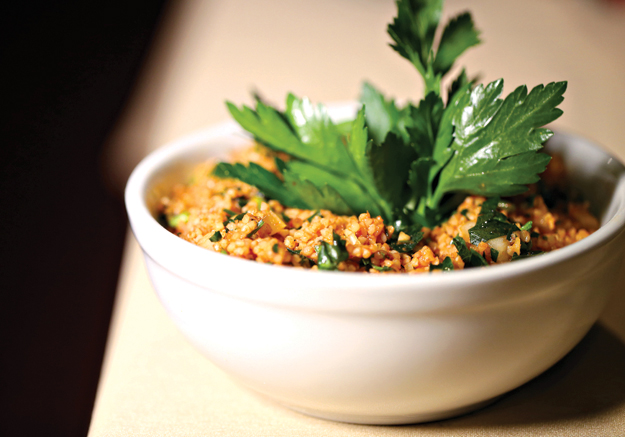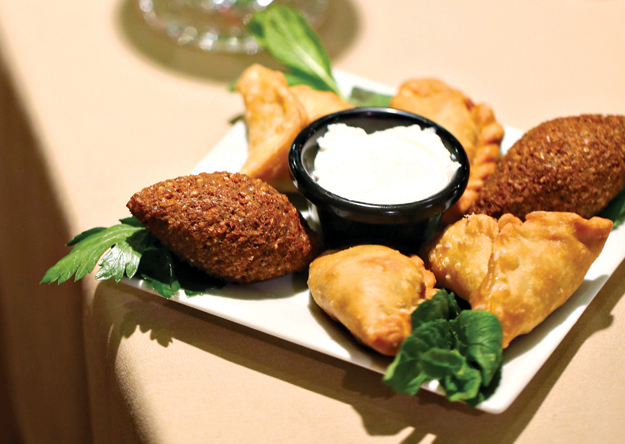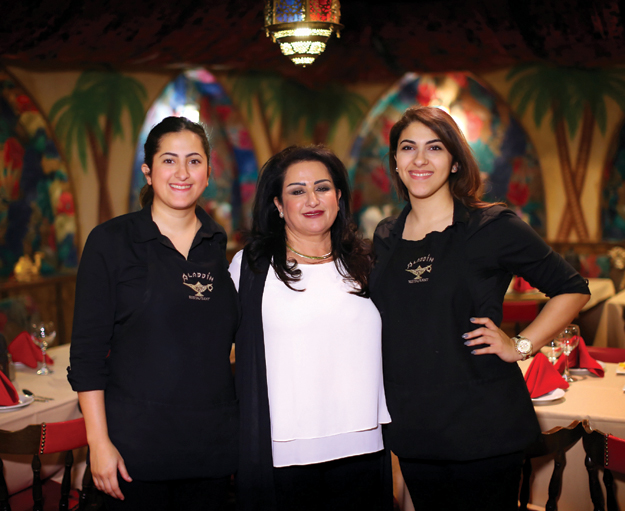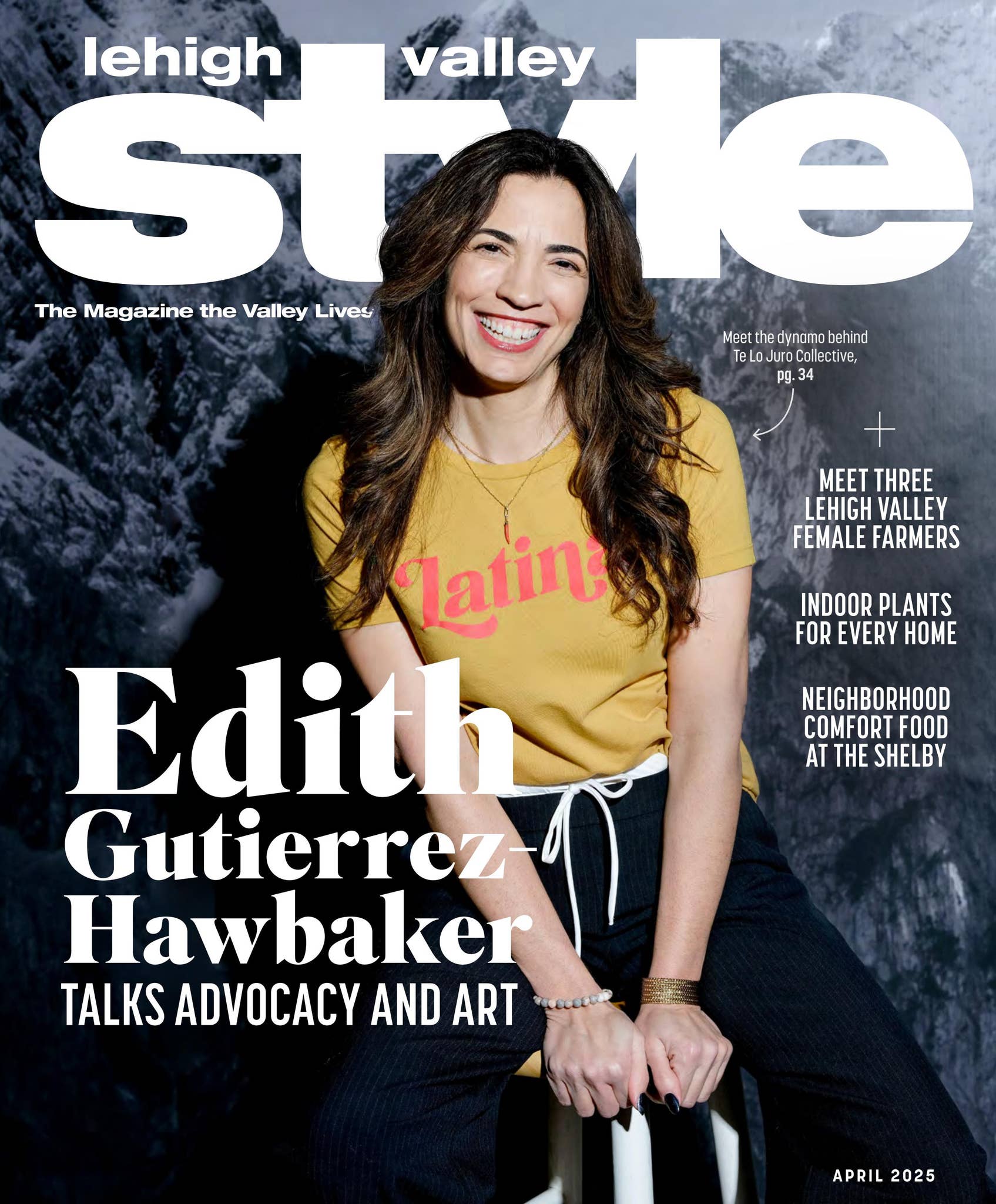
If you've never been to Aladdin, which sits along an unassuming stretch on Union Boulevard, you have no idea of the delicious, made-to-order food that awaits once you pass through the heavy wooden door.
Those who know this restaurant love it. When you've been around as long as Aladdin has—35 years—you're doing a lot of things right. Long-running restaurants have figured out how to wrap people in their warm embrace and keep them coming back for more. Samantha Younes, who serves as the manager, knows this all too well.
“There are customers here who held me when I was a baby,” she says. “I literally grew up in the biz. Coming down into the restaurant, it was like our big living room,” she says.
That's no exaggeration. Aladdin began in 1981 at a Second Street location in downtown Allentown. Younes's parents, Ed and Violette, ran the restaurant downstairs and lived upstairs with their five daughters. In 1999, they moved to a larger location with a dedicated parking lot, and that's where they've remained.
A lot has stayed the same about Aladdin. Regulars know the interior for its white lights on the ceiling, reminiscent of stars. The homemade food, all cooked from scratch and made to order by Violette and two of her sisters, is a hallmark of the place. Violette even makes the bread during the week, wrapped and served warm in a basket, with supplements on the weekend coming from Atie's in Wilkes-Barre—another fresh product with no preservatives. (It's just too much work for Violette to keep up with the demand on the weekends.) The restaurant is sizable, with a total capacity of about 160, and easily accommodates large groups right in the restaurant, with its semi-private and private dining rooms providing space for rehearsal dinners, baby showers, bridal showers, birthday parties, you name it. It makes sense: The service is pleasant, the food is easy to share and it's delicious.
The only thing that's different these days is the fact that Younes's dad is no longer part of the operation—he passed away in 2000. But his spirit is integral, and one of his creations, Ed's Favorite, is a fixed object on the menu. It's a dish with lamb and chicken kabob, served with rice and a side of babaganoush. Among other things, Younes credits him for pushing the business forward. “I don't think we ever would have moved to this location had it not been for my dad. He believed in it,” she says. The business still thrives after all these years, because “we trust each other and we are all working here with all of our hearts,” she says. “It has become bigger than all of us—it eclipses my lifetime,” says the 28-year-old.

Through the years, Younes and her sisters have grown up at Aladdin, gradually assuming more responsibility as they've gotten older, gone to college, gotten married and so forth. The roles have rotated. “We always joke, ‘Who's up at bat?'” she says, citing her sisters Janis and Jamie who have all clocked long stretches at the restaurant, but most of them (except Janis, who doesn't live nearby) are typically on hand on the weekends. Younes says she has been there the longest, for 11 years. The business was never forced on them, she says; her parents gave them all the choice to follow their own career paths, but for her, it was not a tough decision. “I knew this is what I wanted to do,” she says. She enrolled at East Stroudsburg University and received a bachelor's degree in restaurant management.
Younes says Aladdin has retained a strong customer base for many years, but in the past few, business has really grown. “We have so many new customers, people finding us by word of mouth, from friends of friends,” she says. She is not 100 percent sure why, but it's probably attributed to a number of factors. First, the Lehigh Valley has seen some tremendous growth with an influx of residents moving here from out of state. And, for five summers straight, Aladdin has been part of the Easton Farmers' Market, which sees a couple thousand visitors every Saturday morning. “Our catering has grown tremendously [because of the market]; it's gone up to the next level. It's really intense and awesome,” she says.
Ultimately, though, awareness of Middle Eastern food has exploded, even for a region that's historically home to many immigrants from that part of the world. Factor in the amazing, veggie-driven fare of Yotam Ottolenghi's restaurants and the reach of his award-winning cookbooks and, a bit closer to home, Michael Solomonov's restaurant, Zahav, in Philadelphia.
“Middle Eastern food has become so mainstream. You can get hummus and pita at Wawa, along with a quinoa tabbouleh. People know so much more now—they didn't used to know of all these foods,” she says.
Just because they know of them, however, doesn't necessarily mean they have tasted real homemade fare, like the kind you find at Aladdin. And there are so many permutations of these dishes, which undoubtedly spark conversations about authenticity and which country invented which dish, or who does it “the best.” It's the kind of conversation that leaves little room for ultimate, objective truths, which is a bit refreshing. (She says the Greeks take credit for inventing grape leaves, for example.) Middle Eastern and Mediterranean foods share ingredients and dish names, but the iterations often differ. I ask whether she thinks it's a result of regional quirks, or personal preferences. For example, is Lebanese hummus more lemony across the board, or is Egyptian hummus always necessarily more garlicky? (I cite two familiar, local examples of both; we discuss.) Younes doesn't think it can be completely ascribed to regional preferences. “Syrian and Lebanese food are so similar—they are the most similar of all the Middle Eastern countries, which makes sense given how close they are,” she says. It's more personal than geographical. “I think it's just the way one person makes hummus versus another.” For example, she mentions that some Lebanese families will serve grape leaves with a tomato sauce, which feels anathema to her. “We always do butter and lemon,” she says.

Regardless of what dish you select at Aladdin, it's authentic, freshly prepared and made to order, which is definitely discernible to the eyes and taste buds. “They take no shortcuts in the kitchen; everything is made from scratch and with passion,” she says. Additionally, Younes explains that they try to buy as much as possible locally, especially in the summer, picking cucumbers, mint, tomatoes and parsley from their garden in the back of the restaurant, and selecting other produce from fellow Easton Farmers' Market vendor, Salvaterra's Gardens (Alburtis)—spinach for the spinach pie and cabbage for the cabbage rolls.
While we're talking veggies, Middle Eastern food is extremely vegetarian friendly, as many likely already know. But Younes says two changes to their menu, which has been streamlined a bit, include new vegan versions of two popular dishes: grape leaves and kibbeh. The vegan versions include grape leaves (with olive oil, not butter) and kibbeh swaps out the meat for ground chickpeas. “We have lots of vegans and vegetarians and we love catering to them,” she says.
Oh, and you have to save room for dessert, or at the very least, take it home with you. Aladdin makes not one or two, but four different kinds of baklava. “The Greeks say they invented it, but who knows, really,” says Younes. Reheat it gently in the oven or the microwave. “It's so good that way,” she says. Don't miss the Aladdin specialty baklava, topped with almonds and coconut. “It's like a souped-up baklava, a supreme baklava,” she says. The other options include the standard issue with walnuts, one with pistachio (Bird's Nest), or another one that Younes says is also popular—cheese baklava. “My mom makes the cream filling from scratch. It looks like fluffy clouds when she mixes it up,” she says.
One of the most appealing aspects of Mediterranean food is its interchangeability, especially when it comes to mezze. The flavors correspond intelligently, and the food is a cool reprieve that requires little heat to prepare in the dog days of summer. So whether you're dousing grape leaves in lemon juice or dipping your pita in the leftover tahini sauce that drizzles over the cauliflower in arnabit or topping your falafel with tabbouleh, the pieces complement each other. “People often ask, ‘How do I eat this?' I tell them, there's no wrong way to do it. There's no protocol here. If you want to put hummus on your baklava, knock yourself out,” she says.
Aladdin
651 Union Blvd., Allentown | 610.437.4023 | aladdinlv.com
Hours:
Tues.–Fri.: Lunch: 11 a.m.–2 p.m., Dinner: 5–10 p.m., Sat.: 5–10 p.m., Sun.: 4–9 p.m.
Parking:
There's a lot on site.
Reservations:
Recommended for weekends.
Specials:
Aladdin is well known for its Saturday night belly dance performances at 7:30 and 8:30 p.m. On Thursdays and Sundays, on a rotating basis, you can often find live jazz. Whatever you do, remember this: Aladdin is BYOB, with no corkage fee.
What to Order:
The question here is really what NOT to order, so varied are the choices. Start with some mezze—some combination of hummus, babaganoush, arnabit, tabbouleh, grape leaves and kusa will do—to provide an overview. Digging in more deeply, the kabobs are popular. Save room for baklava.














